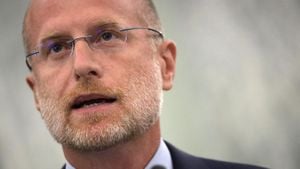At the COP29 climate summit held recently in Baku, Azerbaijan, the undercurrents of U.S. politics took center stage, particularly the looming influence of Donald Trump and his Republicans as they gathered to discuss climate strategies. Trump’s impending return to power has stirred both hopes and apprehensions among global delegates trying to address the pressing issue of climate change.
Republican lawmakers at the summit, including Congressman August Pfluger of Texas, echoed their support for fossil fuels, particularly focusing on natural gas and nuclear energy, as alternatives to rapidly moving away from fossil fuels. This theme was somewhat at odds with the primary objectives of COP29, which emphasized reducing reliance on fossil fuels to combat climate change.
Pfluger, leading the delegation, pointed out, “American natural gas has helped us reduce emissions more than any other nation, and we have the capacity to continue helping our allies reduce their emissions.” This sentiment encapsulates the argument being proposed by many Republicans, who believe the U.S. can be both energy independent and still make contributions to global emissions reduction by using domestic resources.
The backdrop of the discussions revealed the Republicans’ careful positioning as they sidestepped direct commentary on Trump’s past decision to withdraw the U.S. from the Paris Agreement, which remains a significant talking point among international leaders aiming for stringent climate policies. Instead, GOP members suggested modifying the current climate responses rather than dismantling them completely, hinting at their support for certain provisions of Biden’s Inflation Reduction Act if it aligns with economic priorities.
Many Democratic leaders responded with skepticism about the GOP’s priorities. Senator Sheldon Whitehouse remarked, “The U.S. election will have a negative climate impact. I think that's not only easy to say; it’s obvious.” This statement likely reflects the broader concerns among environmentalists about the potential rollbacks of climate policies under a Trump-led administration.
Despite his predecessors’ setbacks, Trump, safe to say, has remained steadfast about dismantling Biden’s climatic laws and endorsing more extensive fossil fuel production. “We need to do what’s best for us,” declared Rep. Troy Balderson, reinforcing the underlying sentiment among Republicans advocating for U.S. energy independence.
The stark realities of climate negotiations were palpable as negotiations at COP29 aimed to solidify more extensive global financing and carbon market guidelines. Meanwhile, Republican lawmakers echoed the importance of “energy diversity” including liquefied natural gas and carbon capture technologies as integral to crafting their proposed solutions.
Highlighting the divide, the event revealed two different philosophies: one advocating for immediate action to phase out fossil fuels, and the other seeking more gradual transitions, bolstered by domestic energy production. Morgan Griffith, another congressman from Virginia, echoed the sentiment, stating, “With technology, we can solve many problems without just banning fossil fuels.”
On the other end, climate envoy officials from the Biden administration have been busy reassuring global leaders about the U.S. commitment to climate action, emphasizing actions being taken at local and corporate coalitions to drive reductions. These offers come amid fears about the future of climate policy under Trump’s expected presidency.
The tension surrounding Trump’s influence at COP29 also highlighted the broader challenges facing the international climate movement, where rich nations and poorer ones often find themselves at odds over responsibilities for emission reductions--an issue expected to heat up as global temperatures continue to rise.
According to climate scientists, time is running out for the world to alter its course significantly and avoid the catastrophic scenarios laid out by climate models. The International Energy Agency underscored the urgency, claiming no new oil and gas projects align with the goals established by the Paris Agreement, which aims to restrict global warming to 1.5 degrees Celsius.
The political ramifications of Trump’s possible re-entry to power loomed large over the climate talks, with many delegates expressing concerns about rolled-back commitments to international climate agreements. The gathering this year serves as both a last-minute push for current policies and as ground zero for potential changes if Republican policies take priority following the election.
Trump's narrative, emphasizing energy independence through fossil fuel enhancement, potentially signals significant shifts at the international climate table. Marching toward renewed commitments or reaffirmations of climate goals will be extremely challenging if the incoming administration adopts markedly different messaging.
Back at the U.S. pavilion, conservative figures emphasized their belief in the viability of nuclear power and carbon capture as part of the solution to climate dilemmas. Heather Reams, president of Citizens for Responsible Energy Solutions, advocated for continued American leadership on climate issues, making it clear she believes remaining engaged internationally is key, stating, “It is symbolic for the United States to be seen as the leader on climate.”
This dialogue reveals the complex interplay between energy policy, climate commitments, and domestic priorities at the COP29 summit. With the upcoming U.S. elections likely influencing discussions, the future of America's role in global climate efforts hangs precariously in the balance.
Negotiators will have to navigate these turbulent waters carefully if they hope to achieve meaningful progress at COP29. The stakes have never been higher, and the need for consensus and actionable solutions is more pressing than ever as the world contends with rising temperatures and extreme weather patterns.



